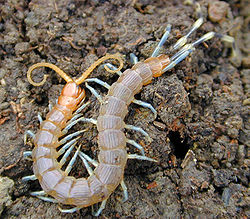百足
Hello, you have come here looking for the meaning of the word 百足. In DICTIOUS you will not only get to know all the dictionary meanings for the word 百足, but we will also tell you about its etymology, its characteristics and you will know how to say 百足 in singular and plural. Everything you need to know about the word 百足 you have here. The definition of the word 百足 will help you to be more precise and correct when speaking or writing your texts. Knowing the definition of百足, as well as those of other words, enriches your vocabulary and provides you with more and better linguistic resources.

百足 (mukade, hyakusoku): a centipede.
Chinese
| hundred | foot; to be sufficient | ||
|---|---|---|---|
| simp. and trad. (百足) |
百 | 足 | |
| alternative forms | 百縮/百缩 dialectal Cantonese 百宿 dialectal Cantonese 百叔 dialectal Cantonese | ||
Pronunciation
- Mandarin
- (Standard Chinese)+
- Hanyu Pinyin: bǎizú
- Zhuyin: ㄅㄞˇ ㄗㄨˊ
- Tongyong Pinyin: bǎizú
- Wade–Giles: pai3-tsu2
- Yale: bǎi-dzú
- Gwoyeu Romatzyh: baetzwu
- Palladius: байцзу (bajczu)
- Sinological IPA (key): /paɪ̯²¹⁴⁻²¹ t͡su³⁵/
- (Standard Chinese)+
- Cantonese
- (Standard Cantonese, Guangzhou–Hong Kong)+
- Jyutping: baak3 zuk1
- Yale: baak jūk
- Cantonese Pinyin: baak8 dzuk7
- Guangdong Romanization: bag3 zug1
- Sinological IPA (key): /paːk̚³ t͡sʊk̚⁵/
- (Taishanese, Taicheng)
- Wiktionary: bak5 lhuuk2
- Sinological IPA (key): /pak̚³² ɬɵk̚⁵⁵/
- (Standard Cantonese, Guangzhou–Hong Kong)+
Noun
百足
- (literary or Cantonese, Pinghua, dialectal Hakka) centipede (Classifier: 條/条 c)
- (literary) millipede; diplopod
Synonyms
Dialectal synonyms of 蜈蚣 (“centipede”)
- (millipede):
Derived terms
Japanese

Etymology 1
| Kanji in this term | |
|---|---|
| 百 | 足 |
| むかで | |
| Grade: 1 | Grade: 1 |
| jukujikun | |
| Alternative spellings |
|---|
| 蜈蚣 蜈蜙 蝍蛆 |
From Old Japanese, from Proto-Japonic *mukantai, of unknown derivation; some theories include:
- a compound of 向かい (mukai, “facing”, the 連用形 (ren'yōkei, “continuative or stem form”) of verb 向かう (mukau, “to face”)) + 手 (te, “hand”), as the centipede's feet come in facing pairs
- a compound of 六 (mu, “six”) + 十 (ka, “ten”, unusual reading; compare the ga in 五十嵐 (igarashi)) + 手 (te, “hand”), literally "sixty hands"; centipedes have more or less than one hundred legs
- starting as a compound of 百 (momo, “hundred”) + が (ga, ancient possessive particle) + 手 (te, “hand”), shifting phonetically: /momo ɡa te/ → /mukade/
While the latter two theories seem plausible semantically, the devoicing of ga to ka is quite unusual.
The kanji are jukujikun (熟字訓), from Chinese 百足 (bǎizú).
Pronunciation
Noun
百足 or 百足 • (mukade) (standard)
(alternative reading hiragana むかぜ, rōmaji mukaze) (Kagoshima dialect)
Usage notes
As with many terms that name organisms, this term is often spelled in katakana, especially in biological contexts (where katakana is customary), as ムカデ.
Derived terms
Etymology 2
| Kanji in this term | |
|---|---|
| 百 | 足 |
| ひゃく Grade: 1 |
そく Grade: 1 |
| on'yomi | |
From Middle Chinese 百足 (MC paek tsjowk).
Pronunciation
Noun
Usage notes
The mukade reading is much more common.
See also
References
- ↑ 1.0 1.1 Matsumura, Akira, editor (2006), 大辞林 (in Japanese), Third edition, Tokyo: Sanseidō, →ISBN
- ^ NHK Broadcasting Culture Research Institute, editor (1998), NHK日本語発音アクセント辞典 (in Japanese), Tokyo: NHK Publishing, Inc., →ISBN
- ^ Kindaichi, Kyōsuke et al., editors (1997), 新明解国語辞典 (in Japanese), Fifth edition, Tokyo: Sanseidō, →ISBN
Further reading
- Etymology at Gogen-Allguide (in Japanese)
- Etymology at Nihon Jiten (in Japanese)
Miyako
| Kanji in this term | |
|---|---|
| 百 | 足 |
| Grade: 1 | Grade: 1 |
| Alternative spelling |
|---|
| 蜈蚣 |
Noun
百足 (nkaji)
Okinoerabu
| Kanji in this term | |
|---|---|
| 百 | 足 |
| Grade: 1 | Grade: 1 |
| Alternative spelling |
|---|
| 蜈蚣 |
Noun
百足 (mukaji)
Tokunoshima
| Kanji in this term | |
|---|---|
| 百 | 足 |
| Grade: 1 | Grade: 1 |
| Alternative spelling |
|---|
| 蜈蚣 |
Noun
百足 (nukade)
